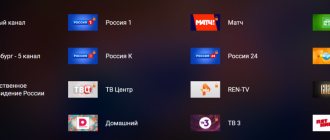Grandiose research by Roman Zagrebin.
Virtual operators (MVNO) are communication service providers that do not have their own infrastructure. In order to function, they rent equipment from full-fledged operators. Any virtual operator has a core network on the basis of which it operates. For example, Tinkoff Mobile operates on the basis of Tele2, and Yota operates on the basis of Megafon.
Virtual operators with the same core network will not differ from each other in either the quality of reception or the speed of the Internet. This, by the way, is the first myth. There are constantly statements from users that Yota catches better than Megafon, or that Tinkoff works better than SberMobile. This is all complete nonsense.
The second misconception is that large operators rent equipment at such prices that virtual operators cannot offer attractive rates. Supposedly the Big Four don't need additional competition and won't dig their own grave.
Already after a detailed study of the tariff plans, it becomes clear that this is also complete nonsense. By leasing equipment, operators receive an additional source of income, without any need to invest in sales. The increase in equipment load for large operators is completely insignificant, so they do not lose anything.
Virtual operators achieve competitive rates for three reasons:
1. Significantly lower marketing and sales costs. A virtual operator does not need to create a huge network of points and invest hundreds of millions in advertising on TV. Their audience is more advanced users, and they are attracted primarily by juicy tariffs.
2. Almost all large operators are created primarily not to make money, but to attract additional attention and build loyalty to the company’s brand and main product. Sberbank and Tinkoff-Mobile have bank cards, loans and deposits, Yota has Internet modems, and Rostelecom has home Internet services.
There are exceptions, but this scheme allows you to keep the company afloat, even if it is not extremely profitable. Unfortunately, this often ends in the closure of the project (like VKontakte, Euroset, Svyaznoy and Karusel).
3. All virtual operators have a fairly small subscriber base (up to 3 million). In order to somehow grow, they are simply forced to offer favorable conditions. Otherwise, you simply won’t be able to grow. But this is only a plus for the consumer - we constantly receive interesting offers.
Have you decided? It's time to choose the juiciest offers. We analyzed the tariffs of the main operators in Russia and selected the most worthy ones.
General rule: when choosing a tariff, never look at the checkboxes with unlimited traffic for instant messengers, social networks, etc. You won't be able to save money on this. Social networks and instant messengers consume an absolutely ridiculous amount of traffic, so purchasing a basic Internet package will always be more profitable. Moreover, almost all operators have removed Telegram from the list of included messengers. The only daw that can really pay off is YouTube, but it is usually the most expensive. So you better score it.
What virtual telecom operators MVNO are there in Russia?
09.11.201803.08.2020
Subscribe to news:
MVNO (Mobile Virtual Network Operator) is a company that sells cellular services to the end consumer, but does not have its own infrastructure to provide such services. Depending on the business model, a specific virtual operator may have only part of the necessary infrastructure (for example, radio subsystems, like Yota) or no infrastructure at all. Like, say, operators of “tourist” SIM cards.
The number of subscribers of virtual operators in Russia at the end of the first half of 2021 reached 6 million people, the researcher calculated. And the main growth, analysts say, has occurred in the last two to three years.
The emergence and widespread use of MVNOs by telecom operators is the main sign of the saturation and maturity of the cellular communications market. This means that the base operators have already mastered all the market niches they have found. But at the same time, they have free network resources that they are ready to sell cheaply in bulk to other companies. And they, in turn, sell them more expensively at retail.
Yaroslav Dubovikov, executive director of the United Telecommunications Corporation (OTK communications operator): “Despite the fact that just a few years ago the topic of virtual operators was not taken seriously, the current pace of development in this area, when every year we see the emergence of dozens of new MVNO projects, speaks of their demand."
So, we present an overview of the most popular domestic MVNO telecom operators.
Calls
If you spend most of your day talking on the phone, the number of gigabytes is not so important to you. In this situation, the best option is offered by German Gref. 1500 minutes on SberMobile will cost only 600 rubles. At the same time, you will also receive 3 gigabytes of traffic, unlimited instant messengers and streaming services. At Yota, a comparable option will cost almost twice as much.
Additional advantages include a 25% discount with “Thank you” bonuses and a 1,000 ruble bonus upon connection if you transfer your number. In short, a great option for a working tube. Thanks to German Oskarovich.
The following works on Tele2 mother networks:
Er-Telecom
Er-telecom - ]Dom.ru[/anchor], has been a virtual operator since 2021. The company produces and sells SIM cards under the Er-Telecom brand. In March 2021, communication was only in the territory of Kirov and the surrounding area. However, by the end of the year the operator was operational throughout Russia. The company provides its subscribers not only with cellular communication services, but also with Internet, digital television and telephony. It also provides telecommunications services for businesses.
Photo: Firestock.
The most budget tariff for individuals, “Write,” includes 350 minutes of calls, 5 GB of traffic and 350 SMS, and all this for 240 rubles per month. The maximum Premium tariff includes 3,500 minutes, 30 GB and 999,999 SMS, the subscription fee is 1,592 rubles/month. Er-Telecom’s main task is to protect itself as much as possible from user churn by providing the entire communications package at a low cost.
However, if you compare the minimum prices in the tariffs of this operator with others, then the offer is “average”. Similar services are provided by MegaFon and Beeline, but for less money.
UPD: MVNO project Er-Telecom was closed in September 2021.
Rostelecom
Until 2014, Rostelecom provided mobile communication services to residents of Russia. Then, in the second half of 2021, the operator entered into an agreement with Tele2 and began operating as a federal virtual mobile operator. Rostelecom focused on tariffs within 4Play. According to Rostelecom representatives, the company is not going to promote other MVNO communication options.
The contract amount was 330.4 million rubles. From the moment the agreement is signed, Rostelecom as an MVNO operator can serve customers in the coverage area of the Tele2 network.
Before launching the main network, the company conducted a trial project of a virtual operator in the Urals. Representatives of Rostelecom are completely satisfied with the results that the pilot program offers. The announcement of the completed project between the two companies took place in 2015. Today Rostelecom is one of the largest operators in Russia.
Central Telegraph
MNVO is a telecom operator whose main shareholder is PJSC Rostelecom. He owns 60% of the authorized capital and 80% of voting shares. Central Telegraph has been operating in the market of Moscow and the Moscow region as a virtual operator since 2006. The company provides legal entities and telecom operators with Internet access, IPTV, rental of communication channels, VPN, MVNO, documentary telecommunications, colocation services, etc. Provides comprehensive solutions for business. Such as: virtual office station IP PBX, video surveillance, “turnkey office”.
TransTeleCom
TransTeleCom (TTK) is a Russian telecommunications company based in Moscow. TTK is one of the five leading Russian telecom operators. The main shareholder of TTK is JSC Russian Railways, owning 99.99% of the company's shares. The operator operates at Tele2 facilities. TTK built a fiber-optic network with a length of 45 thousand km in the railway right-of-way. It connected 974 settlements in 71 regions of Russia. On October 13, 2001, TTC officially began commercial operation of its backbone network.
TransTeleCom provides broadband Internet access (BBA) and cable television (CTV) services. The operator works in populated areas no further than 25 km from the company’s main network (i.e. railway).
Virgin Connect
Virgin Connect is a federal telecom operator based on Tele2 networks. The company is aimed at both retail and business subscribers. Today, Virgin Connect clients include both large federal companies: Alfa-Bank, Euroset, M.Video, and a large number of players in small and medium-sized business segments in all regions of Russia.
Tinkoff Mobile
MVNO telecom operator from Tinkoff Bank. The virtual operator began operating in December 2021 on the basis of the parent network Tele2. Initially, Tinkoff Mobile connected subscribers only in Moscow, the Moscow region, St. Petersburg and the Leningrad region. Today the operator offers its SIM cards in more than 16 regions of Russia.
You can order a SIM card on the Tinkoff Mobile website or through the mobile application. Then the courier will deliver it. In addition to the website, you can purchase a SIM card in Svyaznoy communication stores and in the operator’s own retail outlets.
Tinkoff Mobile offers the subscriber to independently configure the tariff, choosing what and for how much he wants to connect. The designer allows the client to assemble an individual package, including the necessary minutes, gigabytes, SMS, and also connect other unlimited services.
The operator also has three interesting bonuses: 1. The mobile number is linked to a virtual bank account. Accordingly, it can be used for purchases and payments. And for balances over 1,000 rubles, the bank will charge monthly interest at the rate of 6% per annum. 2. You can bind a second number to each SIM card and use it in the same way as the first. 3. An initial bonus is available to each subscriber: when replenishing the account for the first time, the operator will double the payment if it does not exceed 3 thousand rubles.
SberMobile
A virtual operator from Sberbank, which operates on the parent network Tele2. Initially, Sberbank entered the communications market under the name Let's Talk, and from September 26 the project was renamed Sbermobile. The main goal of creating our own mobile communications was to build a unified bank ecosystem. The operator offers potential subscribers convenient tariffs based on a flexible designer that allows you to enable the necessary options - call, SMS and Internet packages. The advantage of Sbermobile communication is a high percentage of cashback (up to 30%) in the form of “Thank you” points. Such a bonus will come in handy for bank card holders.
DANYCOM
Photo: Firestock.
Virtual operator owned by the holding company DANI CALL. It has been providing a variety of telecommunications services for several years. The holding is registered in the city of Krasnodar.
In December 2021, DANI CALL began test operation of a new virtual cellular operator. It ended on June 1, 2018. Danycom's main advantage over its competitors is the complete absence of roaming throughout Russia. The operator has favorable roaming agreements, thanks to which it can boast extremely attractive international tariffs.
EASY4
MNVO operator, which has developed its own intelligent platform for creating virtual operators based on Multi IMSI technology for any business sector. Easy4 is part of the international group of companies EASY CALL. In its work, the operator uses the developments of the Skolkovo Foundation. The Easy4 SIM card can connect to various networks, providing high quality communications and a wide coverage area. Easy4 works on the networks of several Russian and foreign operators. The mission of the project is to create a single space without roaming around the world.
MCN Telecom
The group has been in the telecommunications market since 2000. The group's head office is located in Moscow. MSN Telecom today is a significant player in the capital's cellular communications market. The company is actively developing in the regions. There are representative offices in St. Petersburg, Krasnodar, Rostov-on-Don, Nizhny Novgorod, Novosibirsk, Yekaterinburg, Samara, Kazan and Vladivostok.
The operator operates on the basis of Tele 2 radio access and the infrastructure of the MVNE MTT platform. MSN Telecom has its own infrastructure (communication centers) and all the necessary licenses in all countries of presence: Hungary, Germany, Slovakia and Austria. The operator is included in the list of ten licensed MgMn operators in the Russian Federation.
How to choose
The Virtual Mobile Network concept caught on. The average user does not care about the owner of the infrastructure. An endless list of names will not help much. The leading role is assumed by:
- Marketing Policy.
- Technical support service.
- Tariff plans.
Purely subjectively, the population is irritated by the imposition of services. Some offices openly rob people who apply. Short-term profit turns into long-term aversion and reluctance to use the phone. The policy of draining the finances of distressed individuals is causing popular speculation. Operators add fuel by blocking numbers with a positive balance that have been inactive for 3 months, or by forcibly changing the tariff plan. Individuals and company representatives responsible for providing communications complain. The situation is aggravated by the intention to cancel roaming: deliberately predatory conditions appear for home regions.
Virtual work
The current situation brings little joy to socially vulnerable segments of the population. Grandmothers refuse to understand some subtle marketing ploys.
They work on VimpelCom networks (Beeline brand)
Sim Sim
The virtual telecom operator Sim Sim began operating in 2014 on the parent network of Beeline, which subsequently bought the company. However, the operator continues to operate as a separate structural unit. Sim Sim is aimed at those who need to make frequent calls to the CIS countries, Israel, India, Vietnam, China, the USA, Egypt and European countries. The operator's services are designed to make Russian guests feel at home.
Features of Sim Sim tariffs: ● Unlimited calls within the network and to Beeline Russia numbers. ● Low cost of calls to CIS countries and foreign countries - from 1.5 rubles/min. ● 24-hour support service in four languages: Russian, Tajik, Uzbek, Kyrgyz. ● “Concierge service” for guests of the country. Service specialists tell you how to register a legal stay on the territory of the Russian Federation, help with purchasing tickets and transferring money abroad, and suggest where to buy certain goods. And they answer many other questions that foreign citizens in Russia may have.
Atlas
The company began providing its services from the end of summer 2021 in Moscow and the region. It is noteworthy that subscribers pay for the operator’s services in atlases and, only if there are not enough of them, in rubles. Atlases are received as cashbacks and bonuses for purchases of goods and services of partners. You can also get them by inviting a friend or downloading an offer.
The operator is faced with the task of “covering” with communications not only the Russian Federation, but also the CIS countries.
If a person constantly uses the services of this operator, then every month the company provides him with one of the service packages free of charge. There are five of them in total. They include minutes, visiting Internet resources, watching movies, and so on. Which subscriber will receive a gift depends on the frequency of use of the application. The operator emphasizes that it does not matter to him whether the user pays.
If you don’t have enough traffic, you can always buy it with virtual currency - atlases. They can be earned within the application. The utility allows you to quickly and instantly find and purchase some equipment or other goods. For this, the user will receive virtual money. There is no subscription fee. Moreover, there are no randomly connected services or similar tricks that many mobile network operators resort to.
Also, an Atlas subscriber will never be able to “go into the red.” Communications throughout Russia are charged the same, but calling abroad is not yet possible.
Mobilink
Photo: Firestock.
The company has been operating since 2014. Mobilink is located in the Saratov region, but you can use its communication services throughout Russia. The project developers propose to put an end to monopolists in the communications market. To do this, they are introducing blockchain technologies into the work of the mobile operator. Mobilink plans to provide favorable conditions to smartphone users and oust centralized telecom operators from the market.
Project ideas: ● Each project token holder will receive a Mobilink SIM card compatible with any type of mobile phone. ● Thanks to the blockchain, advertisements will be sent to users’ phones, which will be used to pay for the operator’s voice and information services. ● The operator will support more than 170 countries, which means no roaming. ● Each Mobilink subscriber will receive daily payment in project tokens. ● Token holders will be able to convert them to other cryptocurrencies not only on exchanges, but also in the Mobilink wallet application, which will be available on Android and iOS.
Teletai
A promising newcomer to the telecommunications market. The Teletai company entered the mobile services market in Moscow and St. Petersburg in 2012, and in 2021 its presence expanded to 22 regions of Russia. The operator is based on the resources of VimpelCom and presents a line of inexpensive tariff plans. One of the attractive points in their pricing policy is the low price for all services. At the same time, the quality may fully correspond to large companies or differ slightly.
Combo
If you need both calls and internet, Tinkoff Mobile has the most balanced package. There is no need to choose maximum packages - we take so that there is enough. 16 gigabytes of traffic plus 1200 minutes - it turns out 660 rubles. A more than worthy option if you want to sit on two chairs at once without tearing anything.
The 16 GB package comes with unlimited video, which is also a big plus - usually most of the mobile traffic is spent on videos.
Tinkoff Mobile also has an excellent application, technical support and the most transparent conditions. One of the disadvantages is the intrusiveness of the bank's salespeople, who, after issuing a SIM card, will start calling you with special zeal. Fortunately, they can always be blacklisted.
MVNO telecom operators operating on MTS networks
MGTS
PJSC Moscow City Telephone Network is part of the telecommunications business area of AFK Sistema and is part of the group. Since 2009, the company has been offering digital television and Internet access services. In 2014, the company entered the cellular communications market as an MVNO. And it is the first in the country to offer customers a package of services that includes fixed and mobile communications.
In the autumn of the same year, MGTS begins to implement an automatic control system for client equipment of the TR-069 standard. This allowed the company to significantly improve the quality of services provided. The new equipment made it possible to monitor communication parameters online, analyze the status of subscriber devices, and also remotely configure client equipment. Today PJSC MGTS is one of the largest wireline operators in Europe.
MVNO telecom operators operating on MegaFon networks
Yota
The company appeared in 2007. However, the mobile operator gained popularity only 7 years later, having launched sales of SIM cards in Russia. Since September 2015, the sole owner of all Yota assets is MegaFon, on whose networks the company operates. For subscribers, the company offers unlimited tariff plans with affordable prices, high connection speeds and a large coverage area in Russia.
Yota is the first operator in the world to launch the latest LTE-Advanced mobile connection. A special feature of the company is free communication between network subscribers. The cost of long-distance calls is the same as if the user is in the home region.
Gars Telecom
Gars Telecom is a virtual operator of fixed and mobile communications (on MegaFon networks), system integrator, investor and telecommunications consultant in Moscow and St. Petersburg. The operator is focused on working in the B2B segment. These are corporate clients, office, hotel, industrial real estate development markets, telecom operators, as well as the premium segment in B2C. Gars Telecom provides full-cycle telecom services: fixed and mobile communications, Internet access, rental and construction of channels and infrastructures, system integration and equipment supply, consulting and telecom outsourcing, industry solutions.
NETBYNET
NETBYNET (WIFIRE brand) is an MVNO communications operator with a subscriber base in seven federal districts: Central, Northwestern, North Caucasus, Southern, Volga, Ural and Far Eastern.
The operator provides communication services to private and corporate users. Including broadband Internet access, digital television, virtual hosting, telephony and system integration. For its activities, the operator uses MegaFon as its backbone network.
Classification
Foreign legislation provides a rich classification. It is not surprising, for example, Yota, being part of Megafon, simultaneously buys up some of the resources. The rest he builds on his own. According to the share of other people's capacities, it is customary to distinguish thin and thick operators. Western slang does not translate well - the terms are dissonant. The classification is based on:
- Access to infrastructure: base stations, transceivers, switching centers.
- Tariffing, payment systems, services.
- Services visible to clients: marketing policies, sales, contracts.
Western legislation divides operators according to the set of licenses granted. The type of enterprise shows the “thickness” of the technological base.
Brand resellers
Sometimes called superficial. The company's only assets are concluded contracts and a customer base.
This is interesting! The West tags pretty girls with a similar epithet.
Service Providers
Sometimes called lungs. They provide support services, manage marketing, sell services, and set tariffs themselves.
Advanced service provider
The category is called thick. Part of the infrastructure is the property of the company. Deep attention is paid to brand design and differentiation of services according to tariff plans.
Full-fledged virtual cellular operator
Has a full set of equipment minus mobile networks. He actually rents towers, the rest is available.
Combined virtual operators running on multiple mother networks
Gazprom Telecom
Gaztelecom is an MVNO operator that has been working since 2015 with all Big Three operators. And to switch to a new operator, the subscriber can either change the number or switch to another network while maintaining the number. Gaztelecom was created to: ● Provide communication services based on the free capacity of the telecommunications infrastructure of the gas industry. ● Accelerating the return on capital investments for technical re-equipment and modernization of the technological communication network. ● Implementation of social projects in the regions of presence of gas industry enterprises of OJSC Gazprom.
The operator's services are used by the management and employees of the central office of OJSC Gazprom. As well as gas industry enterprises in a number of regions of the European part of Russia.
Aiva-Mobile
A virtual operator launched in 2014 based on Tele2 networks. The second core network of Quince Mobile is MTS. The company is a leader among MVNO operators in Russia. The company is mainly focused on residents of the countries of the former Soviet Union and Central Asia, but there is also coverage in Russia. For the first time, communication from an operator appeared in Tajikistan. Two numbers are associated with one operator SIM card, each of which is constantly active. There is also the possibility of forwarding and cheap roaming.
Matrix Telecom
A virtual operator operating on the MegaFon basis since 2003. The representative was founded in 1998 and provided international and long-distance communications. In 2000, the company updated its signal technology. And three years later, Matrix Telecom signed an agreement with Sonic Duo (MegaFon brand). Then an MVNO operator called “Matrix Mobile” introduced its first “Unlimited” tariff, which became the beginning of the work of a virtual operator.
As of 2008, the operator had 155 thousand subscribers. Of these, approximately 75 thousand people are the most active. Today Matrix Mobile is expanding the range of its services, collaborating not only with MegaFon, but also with VimpelCom and Tele2. The company is working on integrating its options beyond Moscow.
Over the fifteen years of its existence, the Matrix Mobile project has significantly expanded its capabilities. The operator's offers are not limited to unlimited tariffs. It offers a wide range of services for individuals and legal entities.
Photo: Shutterstock.
The material was prepared with the support of the publication's sponsor. Karting booking Kartings.ru - choose a club on the Karting Map and have fun with friends!
Subscribe to news:
, , Aiva-Mobile, Atlas, Danycom, easy4, LTE, MCN Telecom, mvno, NETBYNET, Sim Sim, tele2, Virgin Connect, WIFIRE, yota, A-Mobile, beeline, Vimpelcom, Gazprom Telecom, Gaztelecom, Gars Telecom, Dom ru, Mango Telecom, MGTS, megafon, Mobilink, mts, United Telecommunications Corporation, telecom operator, OTC, Rostelecom, Sbermobile, sky link, Teletai, Tinkoff Mobile, TransTeleCom, Er Telecom
Operating principle
- A virtual provider has the right to sell services cheaper than the host network, luring away some of the clients.
- Individual characteristics of the average citizen. If I offended you, I’ll leave. A striking example: the relationship between the store chains Pokupochka, Pyaterochka... If you're tired of one, choose another. The owner of the establishment remains the same.
- A well-thought-out marketing strategy sometimes decides the client's choice. A talented virtual operator is able to receive money where the owner of the network despairs of making a profit.
- Sometimes a well-thought-out market strategy allows a competitor to be eliminated by acquisition. Some brands are getting new names.
The essence of the policy of “divide and conquer” is complemented by the reality of life “if you don’t know how to do it yourself, give it to others.” Two short theses completely reveal the hidden essence of the issue.











